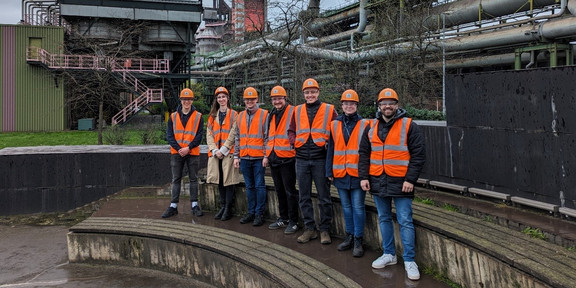2024
Researchers in the DIONA project explore "steel in transition" at Thyssenkrupp Steel

On April 2, 2024, Alexander Apfelt and Katharina Langenbach from the Department of IT in Production and Logistics, Aaron Zilt, Marlon Philipp and Antonio Isopp from the Department of Sociology of Technology and Hendrik van der Valk and Julia Kunert from the Chair of Industrial Information Management at TU Dortmund University had the opportunity to visit a plant tour at Thyssenkrupp Steel in Duisburg on the topic of "Steel in Transition".
During the tour, they were able to experience the steel production process in one of Europe's largest steelplants at first hand and learn about Thyssenkrupp Steel's planned sustainability and transformation efforts. In its planned efforts, the company has placed a strategic focus on decarbonization through green steel using direct reduction furnaces with natural gas and the subsequent use of hydrogen. This gives priority to ecological sustainability in particular. As part of this, however, retraining programs for existing employees are already taking place in order to make them fit for the use of the new furnace technology in terms of social sustainability. The socio-ecological processes of change in the context of structural transition and international location competition repeatedly raise questions that the Social Research Center Dortmund would like to help answer with its labor and sustainability research. Thyssenkrupp Steel is also already carrying out a number of activities in the area of the circular economy, be it the recycling of cleaning water, the use of scrap metal in the production process or the supply of district heating to more than 20,000 households in the lower Rhine region. As a supplier to the automotive industry, the company has an exciting future ahead of it - the TU Dortmund University team would like to thank Thyssenkrupp Steel for the fascinating insights!




![[Translate to English:] [Translate to English:]](/storages/zentraler_bilderpool/_processed_/a/f/csm_Kontakt_b86e8d8ecc.png)
![[Translate to English:] [Translate to English:]](/storages/sfs-sowi/_processed_/7/e/csm_header_collage_sfs_eving_sozialforschungsstelle_dortmund_31bd3c09fb.jpg)